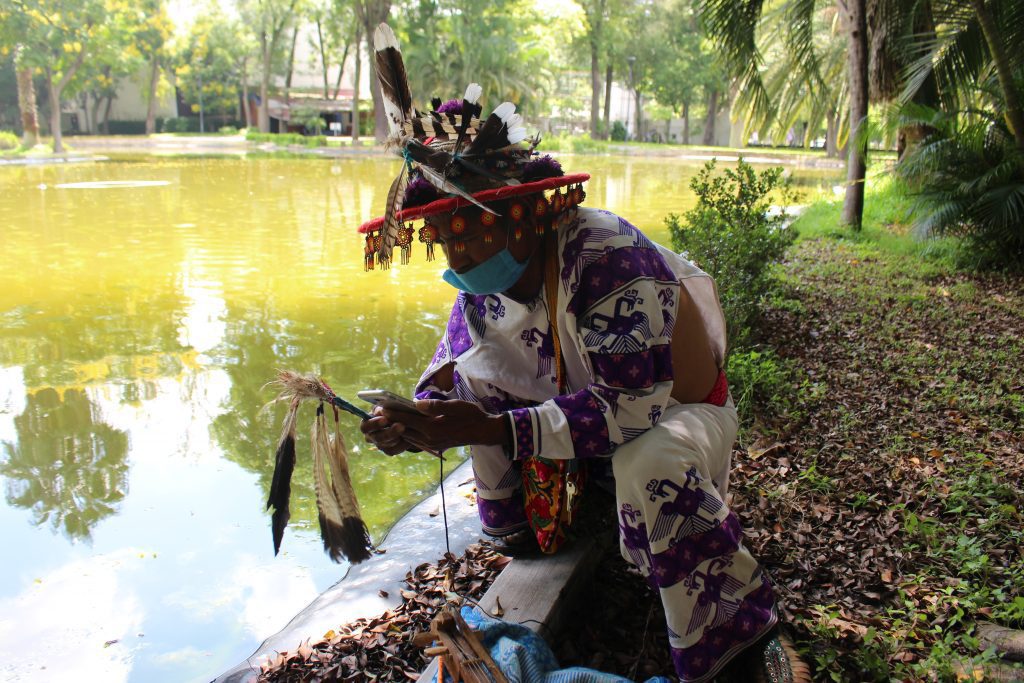
These are hard times in Mexico with the pandemic still surging, and families are really struggling. And here as elsewhere, Indigenous families are among the hardest hit. Thankfully there have been few if any Covid-19 cases in the Wixárika territories as of yet, but there is no money, either. There’s no market for the beautiful artisanry that usually helps them pay the bills.
Classes begin today — online, because of the pandemic — and there is no money to pay the internet bills. I recently sat down with José “Katira” Ramírez, a mara’akame and dear friend and collaborator for many years, to hear his perspective on the pandemic. Katira is currently trying to raise money to pay for an internet signal for his village school. If you would like to help, please contact me at the email at the bottom of this story.
Tracy: Let’s start at the beginning, in the first few weeks of the pandemic. Where were you when you found out about the coronavirus, and what did you think of all this?
Katira: Very good afternoon, my name is José Ramírez García. I am from the community, Tatekie, which means, in the native language of the Wixárika community, House of Our Mother, which is in the north of Jalisco. I am a leader of my community and it has always been my role to serve in many positions.
And so the question is about when I found out about coronavirus disease. Well we made a pilgrimage to Wirikuta this year, as we do every year, in the month of February. After returning home in March, we realized that this type of illness was already beginning, but nobody nobody believed it, because people thought it was a joke.
And we were invited to meetings in Quintana Roo, and so we went, and we were traveling. We found out about a week later and we got the news, that it was very serious, and I didn’t believe it, but my children already knew about it, and my friends, everyone I met. We held a sacred corn ceremony because we protect that sacred seed, because it is our food, it is our mother. But then everything was being canceled. They were saying all the flights were going to close. Well, I thought, there’s no way, and here we were risking our lives, so we thought we’d better come running, and be here, in our community.
But at first we didn’t believe that this disease was happening, because if you do not see it in the news, it feels very different. But then we found out that yes, there were more, and more, and more people dead, from other countries. So when quarantine was scheduled, we had to comply, and today we are here.
I began thinking about how the diseases came to be in the very beginning of time, with the rise of Grandfather Fire, the rise of The Sun and the Moon. When the measles, smallpox, and whooping cough flourished there, at the beginning of time, the spark was fanned, then all kinds of diseases began there. And my father told me of the time when the influenza came and killed thousands of people, I think that now this disease is coming back again. So here’s what I think: Well, yes, we are doing things wrong on Earth, we are destroying everything. We are, and we do it without respect. This is what I thought, and I still think, until now at this moment, and here we are.
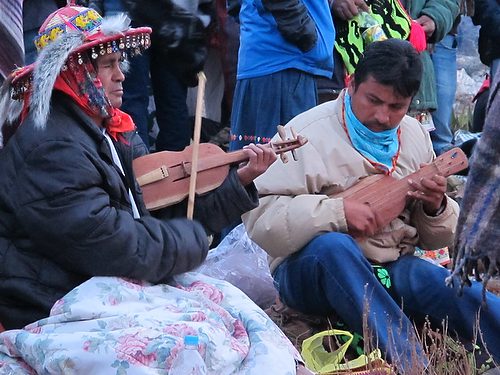
Tracy: Yes, now here we are. And four months later, we have had enough time to live with this coronavirus and enough time to reflect, and I would like to ask you from your perspective, as a Wixárika, as a Mara’akame, as a grandfather: Why is this happening?
Katira: This is what is happening, because the Earth is defending herself. The Earth herself is being cleansed. But yes, her poison is very toxic, and right now it is called coronavirus. So now it is required that we, as defenders of Nature, as guardians of the entire planet, always, that we activate ourselves. I don’t know if it’s because the people are on a wrong path, and nobody cares. There is no activism — let’s see if there are some who do form a group, who do want to support nature, to defend. For example, what happened during the fight to defend the sacred site of Wirikuta, in San Luis Potosí: the motto arose, Wirikuta no se vende, se ama y se defiende (Wirikuta is not for sale, it is to be loved and defended). That’s what the saying refers to. So there is a group that does want to support. On the other hand, there are people who say, “No, no, there will be never be a change.”
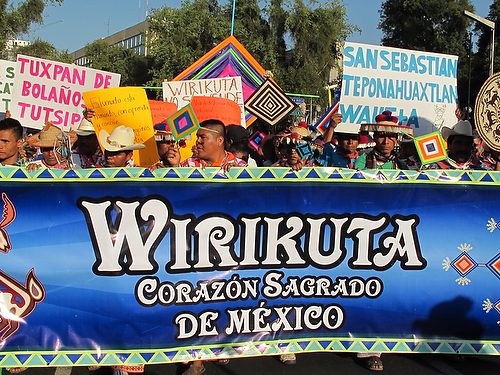
So right now we have to be aware, because really this is not a joke, it is not something that can be easily controlled. So now the one we really need, the one who really knows what to do, is the tiempero. Who are the tiemperos of these times? Who are the ones who really recognize that knowledge, that essence, of nature? So now we need that word, because it is universal, because he is the one who can communicate with the Planet Earth.
Tracy: Before we began this interview, you were talking to me about a dream you had last night. Can you tell me about that dream?
Katira: Well, right now we are in a very delicate time on Planet Earth — and many are speaking to our Creator, to the deities, and last night it came to me in a dream. In the dream, there was a council of elders from all over the world. And everyone who was there had brought their codex, which holds the ancient knowledge and symbolism of their people.
The people got together and a lot of people were talking, talking about their world, each one of them. Each one talked about everything from that time, his codex. A codex is what explains the deities as they were, Tata Sol as he was, and at one point the humans come into being. A wheel with Tata Sol, and the moon, and everything. So now that design of the ancient codex is required. That one that can never be forgotten.
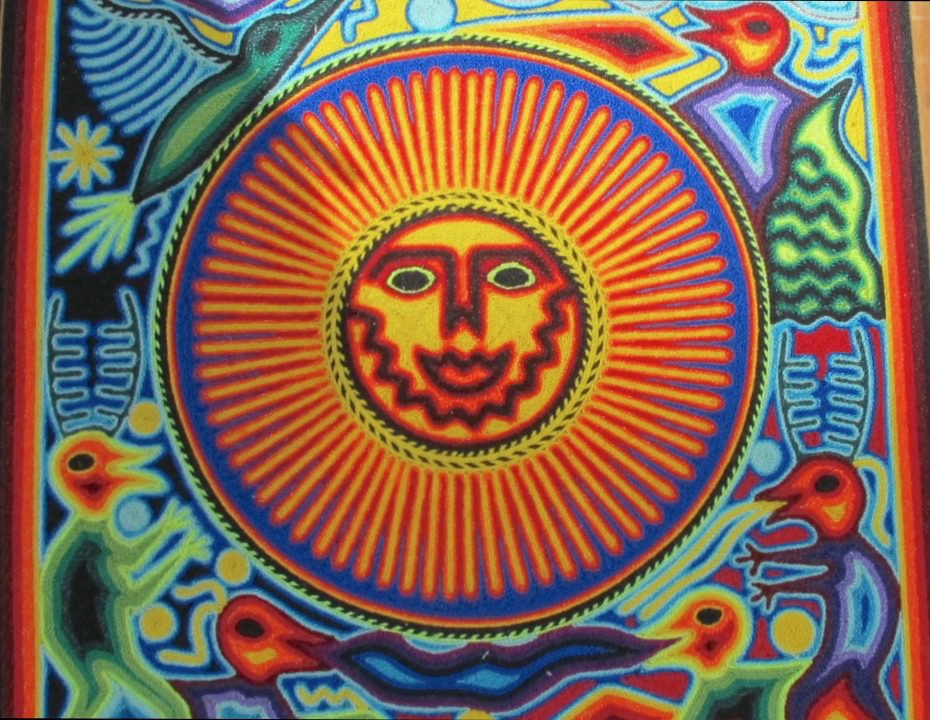
So as I dreamed, each one was working, each of the artisans, each of the carpenters, had a special design, which were ancient objects. So now, again, that is what is required, the design of each one is needed, to leave it on the sacred mountain, to activate them; each pyramid, too, with the Mayans, with the Mexica — I remember a very beautiful design that was venerated at that time … which is the jaguar, the wolf, the deer, the eagle, all the eagles … so that is required, for them to be renewed. And to renew another new book, that is what our world requires.
We really can’t forget the word, this prayer, this sacred word. That is what our Creator says in my dream. So leave this task to the children, to learn this mythology, because this is not the first time this has happened here. If we do not take notice, this disease that has us locked up now, if we ignore it, then other worse diseases will come, or hurricanes will come, or the Earth is going to burn, volcanoes, we do not know.
And what is required now is that everyone take back their codex. For example, here for the Wixárika communities, it is a snake and the eagle, the wolf, and jaguars. The deer is the one that summons, that directs to the four cardinal points and to the four winds.
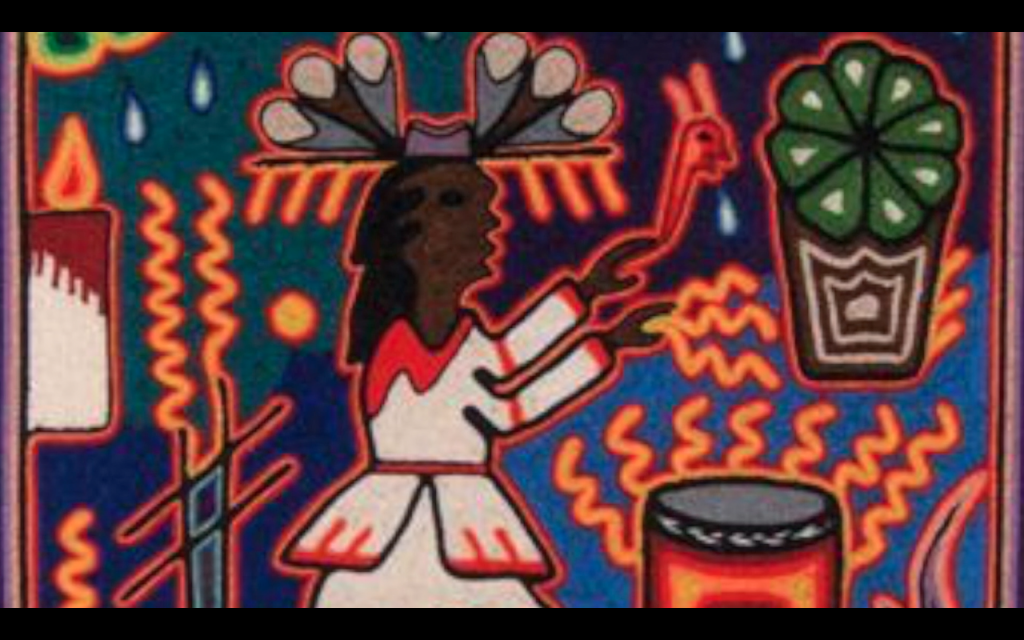
That is what is required so that we can know who is going to stand up and join us. Let’s see who still values their culture. For example, Mexicans are quite a lot of different kinds of people, of different ethnicities. We speak 60 languages. Some have already been lost; still there are those who live looking for their way. Some have already forgotten their culture, due to the arrival of the international highway. They just said, “That’s it, I’m putting my boots on, forget about my mother tongue,” right? All that has been lost.
So, now the one that is required, is the one who is willing to return, to come back bringing your native dress, bringing your sacred song; another brings his codex, and his power objects, because that is the objective of the object. Each ethnic group has its object; for example, in Mexico we have our flag, we have the eagle, and it has all four colors. So in Canada, you have another codex, which has its flag, this leaf of a tree that is very precious.
Each country, each nation, has its codex, a design that is valid to show who is going to stand up for their culture. In the same way, Mexico is now recognized as a cultural treasure. That is why each symbol, each drawing, each design that is worth mentioning has been used. That is what is required by our Creator, our ancestor. What is the codice? What is the objective to introduce yourself? What does the mask represent? I believe that each one of us has different masks, but we are all children of the same Planet Earth and there I believe that this is to value, to venerate.
We know that in the case of the Mayan calendar, it comes with certain symbols. The Mayan calendar is very valid, and so is the Mexica (Aztec) calendar. And there are also different ones; Toltequidad, for example, the civilization of the Toltecs; some very old races. And well, long before, in Mexico, Mexicas used to make offerings of human beings themselves, they sacrificed them, my God! We have not done this for a long time, we are scared of all this, but for certain reasons they did their rituals and now in general, nowadays, we offer instead a calf, a deer, a sheep, among others.
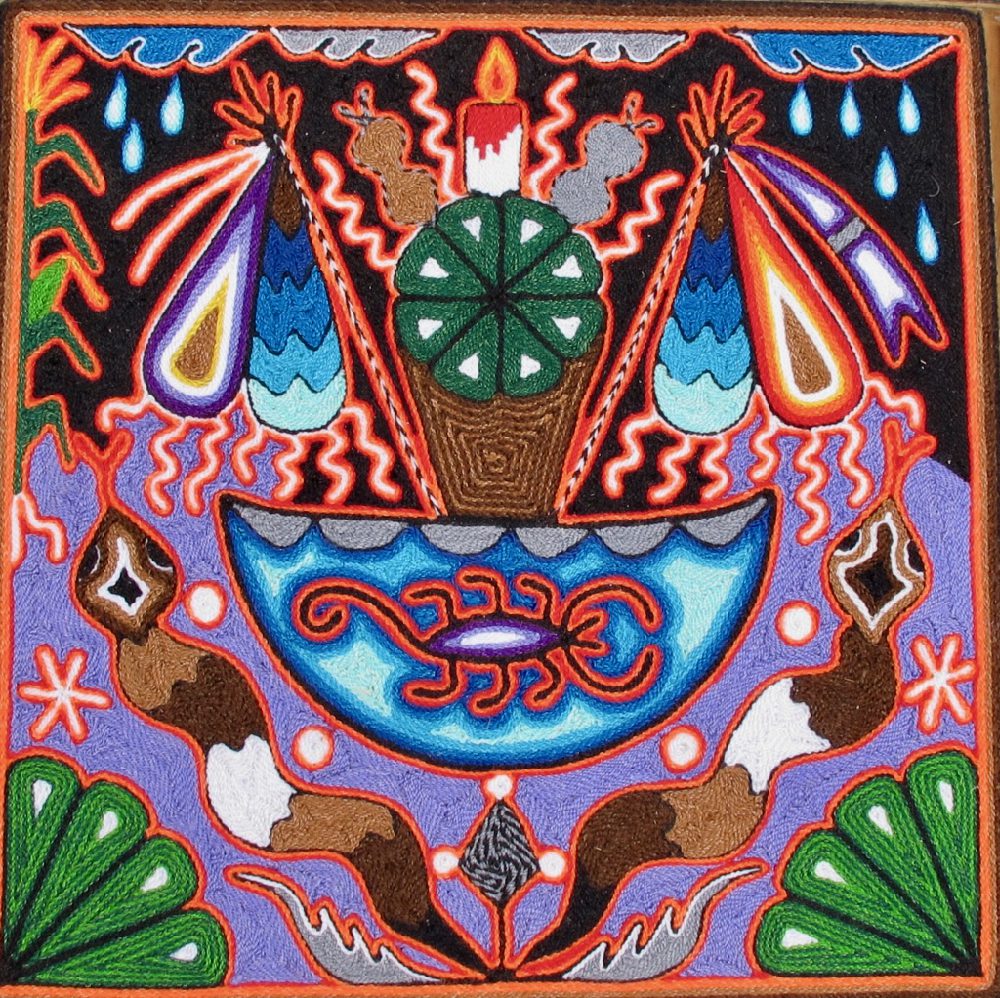
All for a certain reason and one must do it with prayer. Christ also closed the doors with the blood of the lamb, sealed the door at the entrance, so that all kinds of evil do not come to the people. So that’s what is required on this planet. So I think we have to value and come together as brothers and sisters, all of us related. I think this is the time to do a lot of work, and it is this type of work.
This is our remaining task: To demonstrate our identities as all the different nations of the Earth, with all the different brothers and sisters. I believe that it is our task that today that we must do with all our hearts.
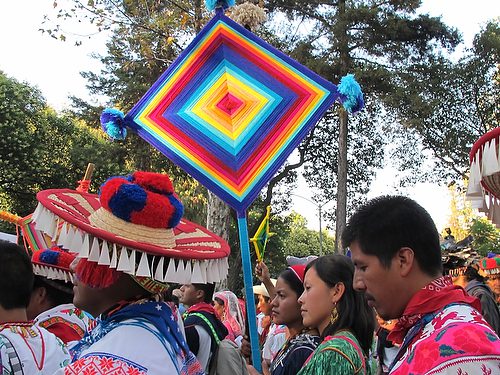
Tracy: So do you think the Earth is asking for blood?
Katira: Yes, of course, but not from humans. All those of the animals, because it is necessary to feed and thus grow together.
If you look back, they made World War I and World War II, and that was very hard. I think that we need to consider ourselves, that we have thought that we are going to make war, between the United States, between China, all of that. I think this is not the time to schedule a war. I think we have to reconcile, we have to look further, more towards the future of our sons and daughters, our grandchildren, because they want to live still too.
So this, then; I would tell these words to the whole planet so that they will find out, so that we can really work, we can work with the mind, and we work with the whole soul. That we have to clean our planet and at the same time have a change.
Tracy: I so agree with you, and hopefully it will be so. Now, returning home … How has this virus affected your family and the community?
Katira: Thankfully, there has been no case in the community so far, but it has affected the economy a lot. Because we are there in the communities, some without work, others without being able to sell their art. And they lack work in the communities. Some have already finished their corn, the ones that sowed little. The ones who sowed more, they still have some. Right now we are sharing with each other, we make exchanges, because one has a chicken, another has seeds, and I have beans. Well, we share by exchanging. So what is required? What does our government think? At the three levels of government, what do they think of doing for us? That is what I am seeing in my way.
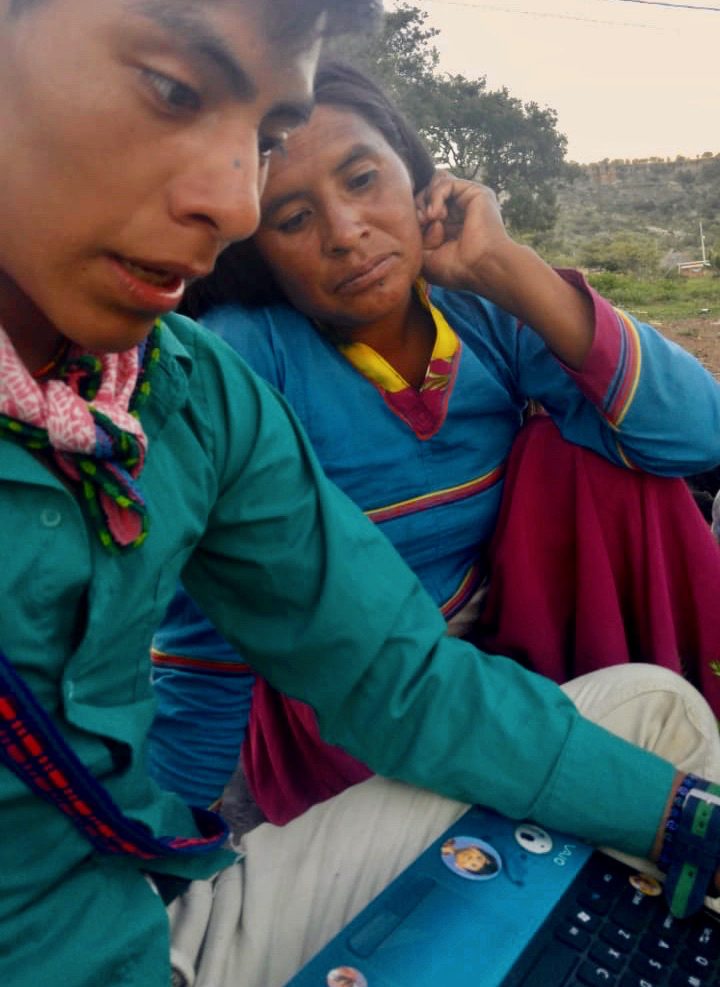
And because all the students have already lost the whole last semester, they didn’t even finish half of their classes due to lack of internet and our economy, and it is a basic necessity for the students and therefore in the communities. Elementary through high school and college. And now the classes are beginning again, and we still do not have internet for the students.
So I would like us to analyze what we are going to do, how we can move forward. We are seeing here because of the need of the Wixárika people, and furthermore we are poor and we do not have even the basic resources, we do not have any company and we do not have any patronizers. Well, we are struggling a lot with this.
Right now we are talking about the months of June, July, August, September, until October. The first or the 10th of October there will be a little bit of corn. Hopefully it continues raining, so that the harvest occurs. It is a hope, because that is why we are praying. We are doing a lot of work and we are asking them for help, and so much for us, we are asking God for rain, so that our children can get ahead.
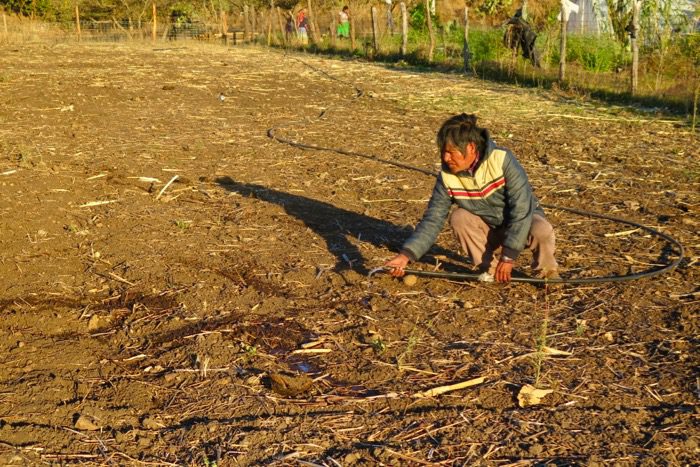
At the same time that we are also working to protect from all kinds of diseases, in the North, in the South, in the West, in the East and in the Center, with Grandfather Fire. So this is how we are working right now, and hopefully the people will collaborate to support us, to support the indigenous Wixárika communities, and we ask that people from different countries might want to support us. I think that would be fine.
What is the use of being so rich? When you die, you can’t take even a nickel with you, so it is better to share with each other. Some people need food, they need to eat, while others are wasting food. Our children need Internet so that they can study. So we ask for your collaboration to continue supporting us.
Tracy: I agree completely. It is such a very hard time, and the Indigenous communities are among the most affected. And on the other hand, I have read of Indigenous leaders who are seeing that there is a silver lining in all of this. I would like to ask if you have seen that despite all the difficulty, if there have been benefits that have come from this pandemic.
Katira: Of course. If all people of traditional knowledge and the scientists, if we unite, the people will see that a solution is really required, and everything will be better. We will heal the Earth, the Universe. We will stay healthy, everything will have to change. That is the message I have received. But if we do not listen and if we do not comply, if we do not put forth a single face, a single heart, then there will never be a change.
So, thinking of a single heart, a single planet, that will change. That is one of the visions that I had last night.
Tracy: A beautiful vision, to be sure. … One more question, on a planetary level. What should we be doing now, as humanity? What lessons should we be taking from this coronavirus and what should we do?
Katira: Well, I think that we have to send our messages to each other, because we can no longer be together during this time. I believe that being in a conference, through the Internet, through email, sending audios as well, and everyone can be present to see how we can go forward, in which direction, how each one of us can analyze this, because each mind is a temple. And how can we strengthen ourselves, because this is not really a joke, that being that really affects people. Many have already lost family, and they have lost many people already. So this pain I think we do have to analyze it because I tell you that the next pain will be stronger.
So I think that before that happens, I think we have to make a coordinated effort, all together, in harmony — as our relatives of the Incas just spoke yesterday from Peru, and also from Canada, because every country, each being, each ethnic group, has its rights, each ethnic group loves its land, loves its mountains, loves its water, because that water is life. So we all must work to avoid contaminating it. And the businessmen must also understand, that now is the time that they lend a hand, that they support, because this creature is not letting us work and there is nowhere to go. So then, let our leaders see what they can support us with. How can we receive support?
That is what I am in favor of for our people, and for the entire planet.
Tracy: I understand. Also I think you are seeing the need for the people to stay more in the community and not to be in the cities, risking their lives, and that’s why they need solidarity. Is that right?
Katira: Yes, solidarity, that is what we need, because we cannot live like this, because we are all human, we always help each other.
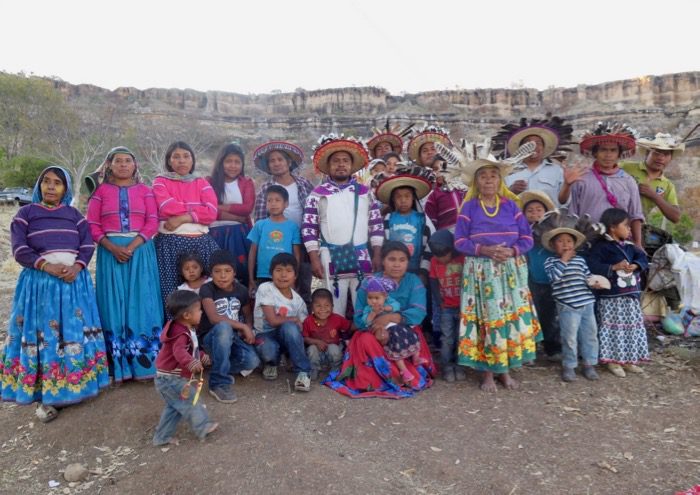
Tracy: Well, are there any final words that you would like to share, to close?
Katira: Of course. Well, just thinking of the beginning of that time, at the time of the emergence of our planet. Because now the world requires cleansing and human reconciliation, and also the reconciliation of the Universal. May the Great Mother, Great Father, Universal Earth forgive us. If we destroy you, forgive us. Yes, to shake hands with each other. That I think is the task we have left.
On the other hand, because this too, after all this, then we see what we really venerate. What is our objective? For the good of the countries, because it is also necessary that the leaders of our countries understand that nature must be cared for. Because the oil company for example is what affects us the most, because all the smoke comes out, and the diseases come from there. And if we realize that at a given moment, to see if there is a hurricane, to see if there is an earthquake, and sometimes strong earthquakes, and now, yes, there comes all this pollution that already causes this type of disease,
So I think that this is a reminder that we really are children of the planet. That is what I would say: So that everyone works together truly with heart, and with faith, we can make a change.
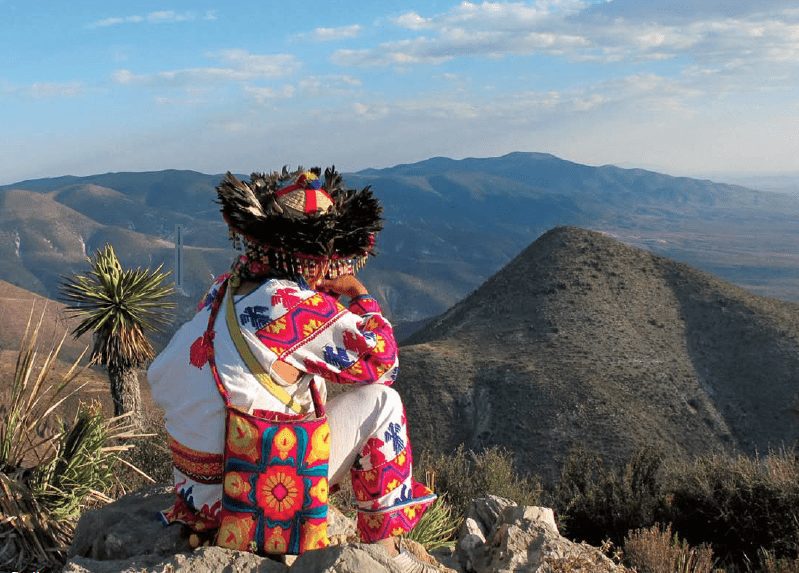
To support Katira’s efforts to install a high-speed internet signal for his village school, please contact me at Tracy (at) theesperanzaproject.org.
Wow. Amazing interview, Tracy. You really are in the heart of it here. Distilled down to its essence. Thank you.
I would love to know more about the tiemperos; their beliefs, customs, work, concepts of the sky perhaps. What do Huichol Tiemperos have in common with Quechua day-keepers? (if anything)
Excellent question, Frank! I’m not sure the tiemperos he referred to are Wixarika, or a different ethnicity; I am very curious about this too but the interview took a different direction and time was limited. I want to delve more deeply into this question the next time I see him. I will keep you posted!
How much is needed for the internet connection?
We have gotten preliminary estimates of around $300-400 for installation, and $100 per month thereafter. We’re looking into it…. will keep you posted! Thanks so much for asking!!
Thank you dear Tracy and thanks blessings all my love to your great project and the people of la Laguna…i know how hard it is to communicate with them with the poor internet… sometimes i also think is a protection so they dont get abduced crazily as we see young people and our very selfs all day long “connected” …the real connection we know is something totally different. Your article is fantastic i hope i can serve their cause as i try to be helpful somehow…our Cuida el Agua video clip will feature don jose thanks to your kindness and promptness too. Much love from Spain
Thank you dear Rosalía… I very much look forward to featuring your work as well when the time is right!!
please advise re contribution for internet connection
This is a wonderful interview giving voice to the Indigenous Peoples on very important issues we are facing today, yet upholding our spiritual practices and beliefs. I would like to request to have the article emailed to me, so I can share it with other Indigenous Elders (I’m a member of the International Council of Thirteen Indigenous Grandmothers) who would be most encouraged to know of the work of the Mara’akame Jose “Katira” Ramirez. In Peace & Friendship